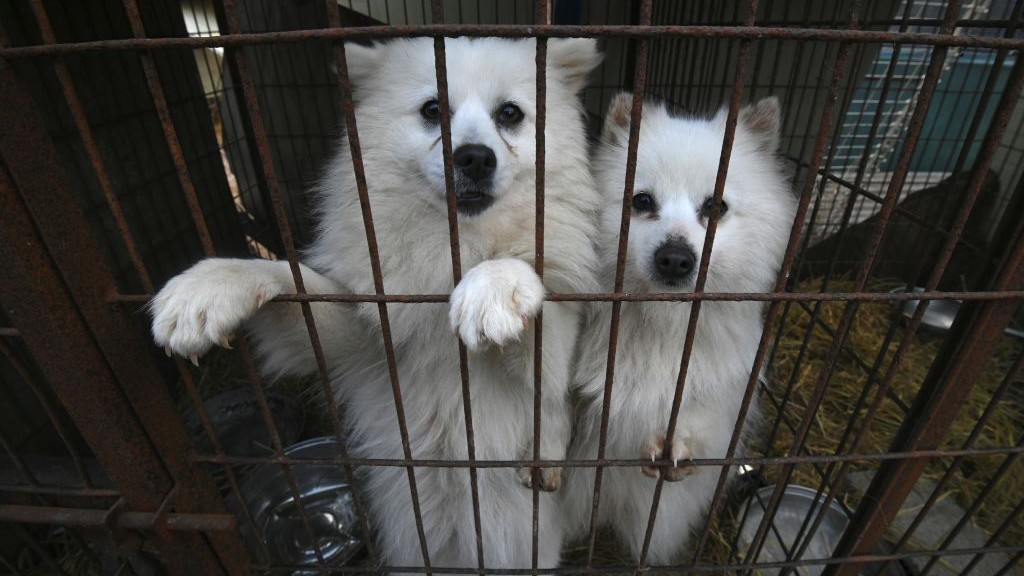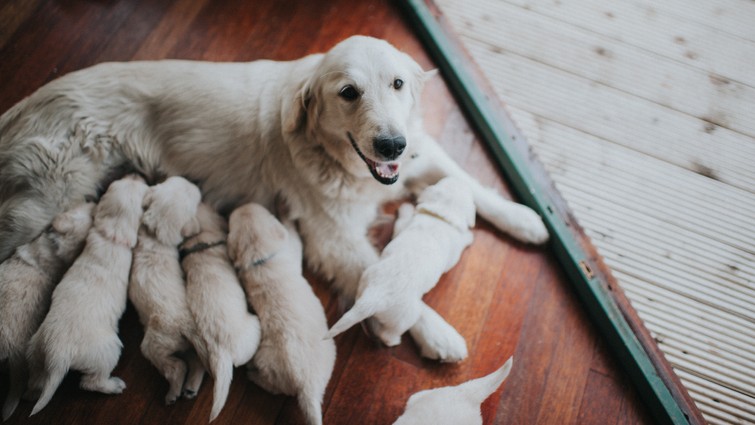How to differentiate a puppy farm from a reputable breeder: Five questions to ask
To find a healthy puppy, make sure you avoid puppy farms by asking these important questions

There’s a lot to consider when adding a new puppy to your family, but finding a trustworthy place to purchase your puppy should be at the top of your list. Unfortunately, many puppies purchased from pet stores and dealers were raised on puppy farms, also known as puppy mills. Although there’s no exact consensus on what constitutes a puppy mill, most would agree that puppy mills prioritize producing a large number of puppies over the health and wellness of the animals in their care. In some cases, the conditions in these facilities may be overcrowded or unsanitary. Puppies from these environments may also be more prone to health and behavior issues. To help you spot a potential puppy farm dealer, be sure to do your research prior to purchasing a puppy and ask these important questions.
- Best puppy food: Great nutrition for healthy, growing dogs
- Best puppy toys: Six options for keeping young dogs amused
- Puppy checklist: Nine ways to prepare for your new dog
- How to make puppies sleep: Five tips to help you and your puppy get through the night
1. Ask to speak to the breeder directly and, if possible, see their facility
One of the quickest ways to spot a puppy from a puppy farm is to ask to speak to the breeder of the puppy directly. A reputable dog breeder will want to ensure that their puppy is going to a good home, and should be willing to answer any questions you may have about their operation, the puppy you are interested in, and the puppy’s parents. They may also ask you questions about your household and lifestyle to ensure the puppy is a good match for your family. If you are purchasing a puppy through a pet store or dealer that sources their animals from puppy farms, you may be told that the breeder is unavailable or that all the information you need is in the puppy’s pedigree. In an effort to make a quick sale, some puppy farm dealers will even try to claim that the breeder didn’t want the puppies and was going to kill them – don’t fall for this emotional manipulation. If the breeder can’t or won’t speak to you directly, move on and find one that will.
In addition to speaking with the breeder, ask if you can come to their facility for a tour. A reputable breeder should have no problem showing you their operation. When you go, be observant. Carefully assess the dogs and their environment. Are the kennels clean, spacious, well-ventilated, and well-lit? Do the dogs seem energetic, friendly, and outgoing? Is there fresh water available to all animals? Do the dogs show any sign of illness such as discharge from the eyes or nose, poor quality coats, or diarrhea? If you are welcomed into the facility and the conditions look good, this is a strong sign that you are dealing with a reputable breeder. If you are discouraged from visiting the facility or the breeder makes excuses to keep you away, it’s quite possible that you are dealing with a puppy farm.
2. Look at the puppies pedigree and ask to meet the parents
If your puppy is purebred, you’ll likely receive a document called a pedigree. This document shows your puppy’s lineage, including parents, grandparents, and great-grandparents. The pedigree should show 3-5 generations and can give you some clues about your puppy’s genetic history. If all of the dogs in your puppy’s line come from the same breeder, this can be a sign that the operation is a puppy mill. If the dealer or pet store claims that the puppy is purebred but cannot produce a pedigree, take this as a sign to move on.
Before purchasing a puppy, you should always make an effort to meet the puppy’s parents and as many other close relatives as possible. It is not unusual for a breeder to use artificial insemination or another breeder’s stud services, so don’t be surprised if your puppy’s sire (father) is not available for you to meet. However, the breeder should be able to tell you who the sire was, who bred and raised him, and why he was chosen for this particular breeding. You should be permitted to meet your puppy’s dam (mother), the other members of your puppy’s litter, and any other close relatives that the breeder has available. A reputable breeder should also be willing to give you a list of references – those who have purchased puppies from this breeder in the past and are willing to speak to you about their experiences. If a breeder or dealer cannot give you information about your puppy’s parents, refuses to allow you to meet the parents, and cannot provide references, then it is quite likely that you are dealing with a puppy farm.
3. Ask what health screening was done on the parents prior to the breeding
A puppy mill exists solely to produce a large number of cute puppies to sell at high prices. On the other hand, a good breeder or dealer cares about the health of the puppies they are selling and the quality of their genetic lines. They will be familiar with the breed(s) they are selling and should be able to tell you how they choose which individuals to breed. While a nice temperament is always desirable, it should not be the only factor considered when choosing which individuals to breed. The breeder should also be able to tell you about the common heritable diseases in their chosen breed. They should be taking steps to prevent these diseases in their lines, including screening individuals prior to breeding. For example, in breeds predisposed to hip dysplasia, orthopedic x-rays should be performed on both parents prior to breeding. For more information about the recommended disease screenings in each breed, check out the Canine Health Information Center (CHIC) Certification Program. In addition to pre-breeding screening tests, the puppy’s dam should also be vaccinated and in good health prior to the breeding. Your breeder should be able to provide you with this information, which you can then discuss with your own veterinarian if you have any concerns.

4. Ask how the puppy was raised while in the breeder's care
Was your puppy raised in a home environment or a kennel? Did they receive any socialization, such as handling and training, prior to sale? How old were they at the time of weaning and when was the dog separated from its mother? On a puppy farm, puppies and their dams are typically kept in kennels or barns and receive minimal handling or attention. Puppies from these facilities are also often weaned and separated at a young age. This means that the puppies are often poorly socialized before making their way to their new homes, which can lead to behavior problems in adulthood. Because the critical period of socialization for a puppy occurs from about 3-14 weeks of age, many reputable breeders will be taking steps to begin socializing the puppy prior to sale. This may include getting the puppy used to handling, exposing the puppy to new environments, and possibly even starting important lessons like potty training and crate training. Depending on your puppy’s age at the time of purchase, your puppy may have also had his first veterinary exam and any age-appropriate vaccinations.
Get the best advice, tips and top tech for your beloved Pets
5. Talk to your veterinarian before making the purchase
Your local veterinarian is likely familiar with pet stores and puppy dealers in your area. He or she can tell you about the health and temperament of the puppies coming from those businesses and may be able to help you find a reputable place to purchase your new puppy. If you are looking for a specific breed, your veterinarian may also be able to recommend a local breeder for you. If the breeder is able to provide you with any documentation, such as the puppy’s pedigree and vaccination history, your veterinarian can also help you look for potential red flags in these documents. Most importantly, after purchasing your new puppy you’ll need to have him examined by your veterinarian to ensure he is healthy and ready to begin any age-appropriate vaccinations. Your veterinarian is a great resource for any questions you may have before, during, or even after the purchase of your new puppy.
Do your research before purchasing a puppy
Ultimately, the best way to avoid inadvertently supporting a puppy mill is to do your research prior to purchase. Most quick-sale operations, such as pet stores and online puppy brokers, source their puppies from puppy farms, although this may vary depending on your state and local laws. A puppy should never be an impulse purchase, so be wary of those who try to sell you one on the spot! A reputable breeder will want to know that their puppy is going to a good home, so do your research and don’t be afraid to ask questions. With a little patience and care, you’ll soon find a healthy, happy puppy to add to your family!
Dr. Elizabeth Racine is a small animal general practice vet covering all things pet health and wellness. Her special interests include veterinary behavior, nutrition, and internal medicine.
As a freelance writer, Dr. Racine has written content for major companies in the industry such as the American Kennel Club, Merck Animal Health, Bayer PetBasics, Elanco, and CareCredit. In her free time, Dr. Racine enjoys playing trampoline dodgeball, hiking with her beagle Dasher, and spending time with her three mischievous cats.

